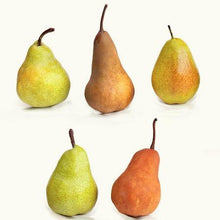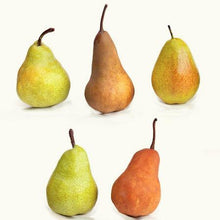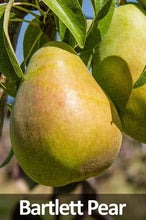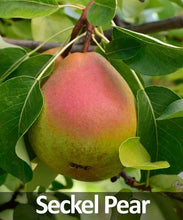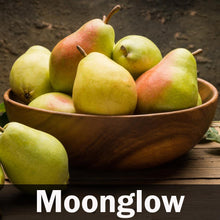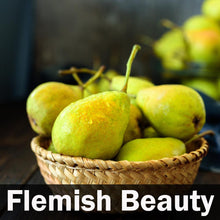
Get 5 Types of Pears from 1 Tree
5 Different Varieties of Pears
For pear-lovers, this tree is the ultimate. You'll get a long-growing season because as one variety produces its bounty for the summer, another variety is right behind it. From June through September, your tree will produce 5 of the best varieties of sweet, delicious pears. It's always a joy to anticipate the next variety coming in. Every few weeks you get to enjoy a new flavor from the Anjou, Bartlett, Flemish Beauty, Moonglow, and Seckel Pears!
Hand Grafted for Perfect Pears
We hand graft 5 different varieties of pears onto a single trunk. The tree is groomed for years at our nursery and is not shipped out until it is ready to perform. This ensures that you receive a healthy tree that is ready to thrive in the very first season. This 5-in-1 Pear Tree is self-pollinating, so you only need one tree to produce a hearty bounty of pears.
Easy to Own
A compact tree that takes up little space, you won't need a large landscape to grow and enjoy all of this fresh fruit. It will reach 15-20 feet tall at maturity and about 10 feet wide. Best grown in USDA Zones 5-8, it is capable of tolerating temperatures as low as -10°. Plant in a sunny location with well-drained soil and this tree will perform with ease. It's easy to love it for all of the delicious fruit, but there is more to admire, as it's a beautiful tree in itself. While the different varieties add interest from spring through summer, it also provides a wonderful display of fall color each year.
Save Money on Winter Gift Baskets
Who doesn't love to receive a gift basket during the holiday season? It's a great way to show family, co-workers and neighbors your thoughtfulness, but retailers overprice them drastically. When you have a 5-in-1 Pear Tree, you'll have an abundance of pears that will keep through the fall and into winter. Why not create your own baskets of pears, and even get creative with home-made canned, dehydrated pears or sauce.
Order Now
We'll deliver your 5-in-1 Pear Tree the next business day. Our helpful pros on the other end of the line will answer any questions you may have.
Planting & Care
A unique addition to your landscape, the multi-graft pear (Pyrus communis sp.) tree will provide you with loads of multiple varieties of pears with only one tree! Reaching heights of 15-20 feet tall and 10 feet wide, it’s compact enough for a small yard and the fruit is more easily harvested. Growing in USDA zones 5-8, the tree is cold tolerant down to -10 degrees and requires approximately 600 chill hours (depending on the variety of pear), so most varieties will produce, even in warmer climates. This tree also provides several months of interest as it blooms in early spring, produces fruit in mid to late summer, and excellent fall color. Multi graft trees are self fertile so you only need the one tree for fruit!
Location: Give your pear tree a location that features full sun and well-draining soil. Choose a bright, sheltered location, preferably with southern exposure.
Planting Instructions (in ground):
1) Dig a hole three times the size and just as deep as the root ball. You want to be careful that the tree does not settle too low in the soil.
2) After the hole is dug, carefully loosen and unwind any roots as necessary.
3) Plant the tree so that the roots are spread in the hole and the entire root ball is covered with soil.
4) Fill in the hole completely and gently remove air pockets that may have formed by tamping down with a spade.
5) Water the tree thoroughly after the tree has been planted.
Watering: Water your pear tree as necessary giving it at least 1 or 2 inches of water once a week. When the weather gets hot and dry during the peak of summer, increase the amount of water to maintain proper hydration and moisture. Do not water the pear tree after the first frost in the fall. You should resume watering once the last frost has past.
Pruning: When pruning, it’s important to trim the pear tree’s central leader to promote an upright position. If there are any competing branches present, remove them so that multiple leaders do not form. Maintain the tree’s natural shape by pruning large, lateral branches. Dead, dying or wilted branches should always be removed to help the Pear Tree focus its energy on growing healthy and producing an abundance of fruit.
*Tip* It’s always good to sterilize your cutting tool(s) with rubbing alcohol to ensure a clean cut that no pathogens can get into.
Pests: Pear trees are susceptible to insects such as maggots, moths, scale and aphids. To prevent infestation of these and other pests, treat with an insecticide in the early spring. Signs of infestation to be watchful for include yellowing or browning of foliage, rotted or eaten fruit and nibbled leaves. Spray the tree with the insecticide according to the directions on the label.
Tips:
*Harvest pears at the end of the growing season (October-November). Watch the fruit regularly, as it will require two to three weeks to harden before harvest.
*Pick pears when they have reached full color and size and are firm to the touch. Check the tree daily and pick fruit every two to three days until your harvest is complete.





